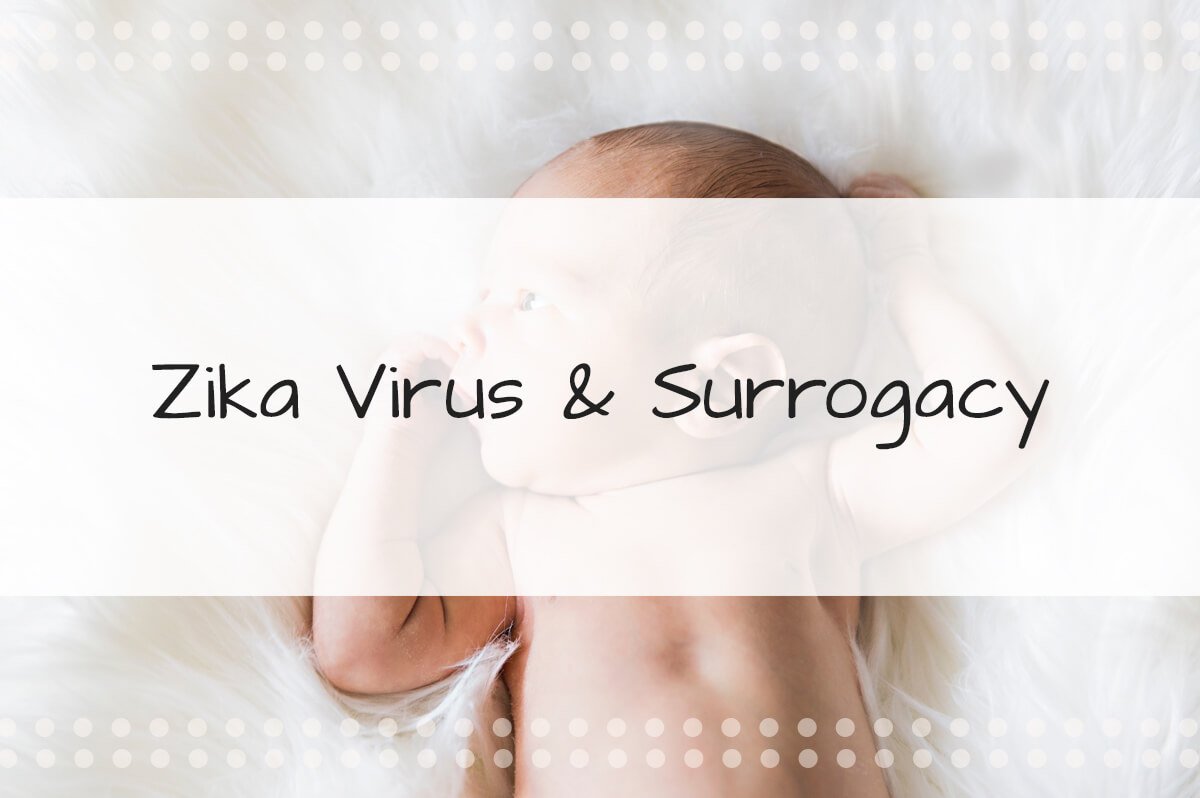
The Zika Virus and Surrogacy: A Comprehensive Guide About What You Need to Know About Zika
Recently, there has been a lot of focus on the Zika virus and its role in pregnancy.
Women who have traveled to countries where the Zika virus is prevalent suddenly found that their babies had birth defects after they gave birth. These defects were caused by Zika.
As a surrogate mother, you may wonder if you should worry about Zika.
The answer is an absolute yes. Since you are going to be carrying someone else’s child, you need to do everything that you can to promote the health of that baby. That includes knowing everything that you can about possible hazards to the baby’s health.
In this article, we’ll discuss everything that you need to know about surrogacy and Zika.
Surrogacy
First, let’s talk about surrogacy.
As a surrogate mother or soon-to-be surrogate mother, you’ve made the incredible decision of helping intended parents bring additional members into their family.
These parents have been looking everywhere to find a surrogate- or been struggling with infertility for a while.
When they come to our California surrogacy agency located in Roseville, CA—chances are, they’re looking for a surrogate just like you.
Now that they’ve finally found you, after you’ve undergone our lengthy on-boarding process for new surrogates and met all of our qualifications—you will be attending a fertility clinic to begin in-vitro fertilization or IVF after you have been matched with intended parents.
With some luck and science, you may find yourself pregnant in no time.
Now that you are pregnant, it’s up to you to ensure that you’re making the best decisions to protect that baby.
The intended parents are relying on you keep their baby safe and healthy. This can be an easier job than it might seem so long as you keep yourself educated on matters like Zika.
Because you may be using surrogacy as another way to support your own family, you don’t want parents who are looking to find a surrogate pass you by because you didn’t take the time to learn about factors that can negatively impact the health of a baby.
More importantly, there are many surrogate agencies in California who explicitly state in your surrogate contract or GSA, travel restrictions that restrict you from traveling to countries that have a large account of Zika being present.
Going to those countries could result in the termination of your contact with the intended parents. To not only protect the baby but yourself, you need to know what countries to avoid and why you need to avoid them.
Zika Virus
The Zika virus has been around for some time.
However, it has only recently been linked to birth defects in children. Zika can be transferred to humans through a mosquito bite from mosquitos who are infected with the virus.
The symptoms can be quite mild to the point where a person who was infected with Zika may not even realize that they have it. Even pregnant mothers who are bitten by an infected mosquito may not realize it until their baby is born with defects.
The CDC says that you can become infected with Zika in two ways:
- The first is through the bite of an infected mosquito.
- The second is having sex with a partner who is also infected with Zika.
As such, it is vital that a surrogate mother both stays out of Zika-confirmed areas and ensures that her partner stays out of those zones, too. Sex should either be protective or limited until after the baby is born.
Symptoms of Zika
If you are bitten, there are a few symptoms that you may experience.
Though, typically, people don’t notice any symptoms at all. Some of the symptoms that you may experience are fever, muscle pain, red eyes, a rash, joint pain, and a headache.
These symptoms can last for quite a few days but not typically longer than a week. Zika is not typically lethal to an adult.
The virus can stay in the blood for about a week after it has been transferred. During that time, it is possible for a pregnant woman to transfer the virus to their fetus.
For women who are intending to go through an in-vitro fertilization procedure with intended parents, a fertility clinic suggests that you test yourself for the virus if you’ve been in areas where Zika is present first.
IVF involves the transfer and transplant of a fertilized egg into the body of the surrogate. If you already have Zika in you and undergo IVF, then you risk transmitting it to the new embryo.
In some cases, this might make your body reject the embryo from the start. This will force the intended parents to go through the in-vitro fertilization process all over again. You’ll be wasting their time, your time, and their money.
Instead, you should be responsible and have yourself checked out in the event that you are carrying the virus. Surrogacy in California takes the health of the baby, the surrogate, and the intended parents seriously.
As such, we may have to terminate or pause your contract until the Zika has been removed from your body entirely.
The tests are typically quite easy to have done. You’ll either be given a blood test or a urine test.
If Zika has been discovered in your blood, then you can be given treatments that can prevent infections from occurring in the future.
Birth Defects Caused By Zika
So, why are fertility clinics, surrogate agencies in California, and parents everywhere concerned about Zika?
This virus has been proven to cause many defects in the brain.
Among the most popular is Microcephaly. This birth defect essentially causes the baby’s head to stay small in development.
Because the head is small, the brain is also small. In many cases, the small brain is not developed correctly.
Sometimes microcephaly can occur without other birth defects present.
Other times it is just one defect of a series of defects that plagues the baby. Some of the problems that can result from microcephaly that the baby will suffer from are seizures, issues in post-birth development like talking and walking, a decreased ability to learn and think, difficulties with mobility and balance, problems swallowing, vision problems, and hearing problems.
Parents who have taken the time to extensively search for a “fertility clinic near me,” and have taken the time to find a surrogate can be understandably heartbroken when the baby they’ve waited years for has birth defects.
While this does not mean they’ll love the baby any less, everyone hopes for a healthy baby.
Perhaps the saddest aspect of babies who have development problems due to Zika is that it could have been prevented in the first place.
All the surrogate needed to do was stay away from Zika-prone areas in the world—or notify our surrogacy agency that you have been to these affected areas as a part of your screening process.
Surrogacy and Zika don’t end with microcephaly either.
While Zika may not be a cause of Guillain-Barré syndrome, some studies have indicated that a fetus that has been exposed to the virus might be at more risk of developing the syndrome.
Guillain-Barré syndrome, or GBS, is a terrible affliction that causes the immune system to target its own nerve cells. In many cases, this can cause muscle weakness. It may even cause paralysis.
Currently, the CDC is still studying the link between Zika and GBS.
However, initial reports do seem to indicate that there is some relationship between the two. GBS is a condition that can affect the baby from its birth and all the way through their adult life. It’s something that they and their parents will have to suffer from forever.
Surrogate agencies in California want to ensure that surrogates are being as proactive as they can in keeping themselves safe from Zika.
We don’t want intended parents to have their joy interrupted by grief over the problems that their baby will face.
Avoid These Places
There are a lot of hurdles that a surrogate has to jump in order to be ready to meet their intended parents.
First, the parents have to find a surrogate. Then, they need to conduct a simple search for a “fertility clinic near me,” in order to find one that offers IVF. As a surrogate, you’ll then undergo in-vitro fertilization to receive their embryo.
That’s after you’ve gone through the necessary health checks and paperwork, too.
Finally, you’re pregnant with their child. Now you have to place the baby’s health and wellness above your own.
To do so, you should research areas that are prevalent with Zika. The CDC lists a few and any fertility clinic would suggest staying away from those areas permanently if you wish to be a surrogate long-term.
Unfortunately, the United States has had cases of a Zika outbreak in almost every state.
Currently, there are no outbreaks at the time of this article, but during the summer, you should always keep up to date to know if your hometown is currently seeing an outbreak.
Other places that have reported past outbreaks are Mexico, South America with the exception of Uruguay, India, the Philippines, Indonesia, Angola, Nigeria, Ethiopia, Gabon, Cameroon, Ivory Coast, and Senegal.
As a premier surrogacy agency in the Sacramento area, we suggest protecting yourself if you are traveling to these areas, and always being upfront in your surrogate screening process and throughout the process of becoming a surrogate if you have been to these areas recently. Outbreaks should be avoided at all costs.

If you are interested in becoming a surrogate with made in the USA Surrogacy- please fill out our intake form!
If you are a parent who is looking for a surrogate, we also encourage you to fill out this form.
